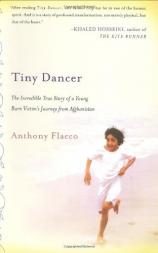Reading Group Guide
Discussion Questions
Tiny Dancer

1. When the Special Forces Sergeant first encountered Zubaida, he found himself confronted with a powerful ethical dilemma. He could not make himself turn away from her, but there are strong military regulations against pulling a civilian into combat hospitals. (What if insurgents were using her as a decoy?) He risked a court martial and imprisonment, but went ahead anyway, as did others. How would you have handled it?
2. How much does reading mean to you? Throughout the reign of the extremist Taliban regime, women in Afghanistan who dared to meet to teach reading or discuss books could be beaten, tortured, and even expelled from their families by order of the ruling local cleric. Would you dare to meet with other readers under such conditions? If not, could you stand to go without reading?
3. Many people have asked why there should have been so much help for one little girl, in a world filled with suffering children. Nobody involved in the story can explain it, but many commented that this story seemed to have a life of its own. One wrote about the strange "divine coincidences" that kept occurring. According to your belief system, do you think it is possible that some larger force was at work, or was Zubaida simply lucky?
4. Do you vote? Even though many pundits predicted possible violence against Afghan women who dared to actually show up at the poles and exercise their newly won right to vote, the women turned out in a wide majority to help elect President Ahmed Karzai. One woman walked into the polling place from her birthing bed, carrying her newborn. If you don't vote, what would it take to making voting seem worthwhile to you?
5. The specter of a renewed Taliban hovers behind the continuing violence from Islamic fundamentalist groups, and Taliban sympathizers remain poised to envelop Afghanistan once again. However, this time they will face a female population who has tasted individual freedom and literacy for the first time in their lives. Do you think that they will tolerate renewed oppression?
6. All over Afghanistan, there is a continuing crisis with burn and explosion injuries from millions of landmines and bits of unexploded ordnance. Do you see the possibility of American private aid establishing burn centers in Afghanistan? Even though they might be taken over and used by enemy forces, if the Taliban returns?
7. People often ask each other what books we would want to have with us on a desert island. Are there any that you would risk your life to own?
8. Why do you think that Zubaida was able to acclimate to life in an affluent American surgeon's home and to an American school, but then freely give it up and eagerly return to her desert village?
9. Zubaida's father was sick with dread over the prospect of leaving Zubaida in America for a year of life among "the Others." Even though she was exposed to every "decadent" pleasure that life in Southern California can offer, she ended her year there without feeling as if she ever met any of "the Others." How is that so?
(a) Or did the individual awakening that she experienced here constitute the very "corruption" that the fundamentalist mullahs fear?
10. This book posits that the combination of personal freedom and opportunity in America allows innate human compassion to intersect with the personal ability to affect change, and that typical American optimism is to trust that others on the path ahead will make similar choices, to keep the motion going. If that's true, you should be able to think of other situations where a number of individuals each made small, independent acts of conscience, and where those actions then connected in some way to create a positive change. Can you?
Tiny Dancer
- Publication Date: September 1, 2005
- Hardcover: 256 pages
- Publisher: Thomas Dunne Books
- ISBN-10: 0312343337
- ISBN-13: 9780312343330








